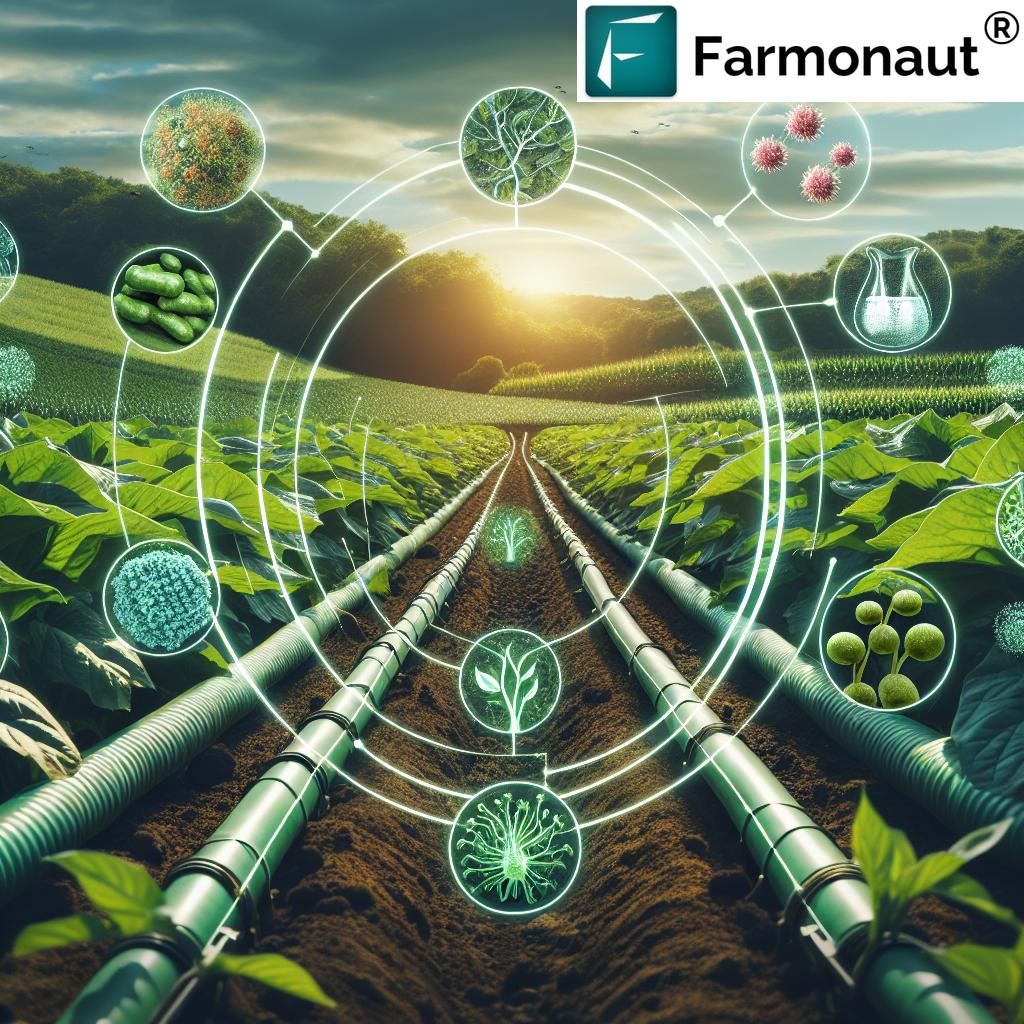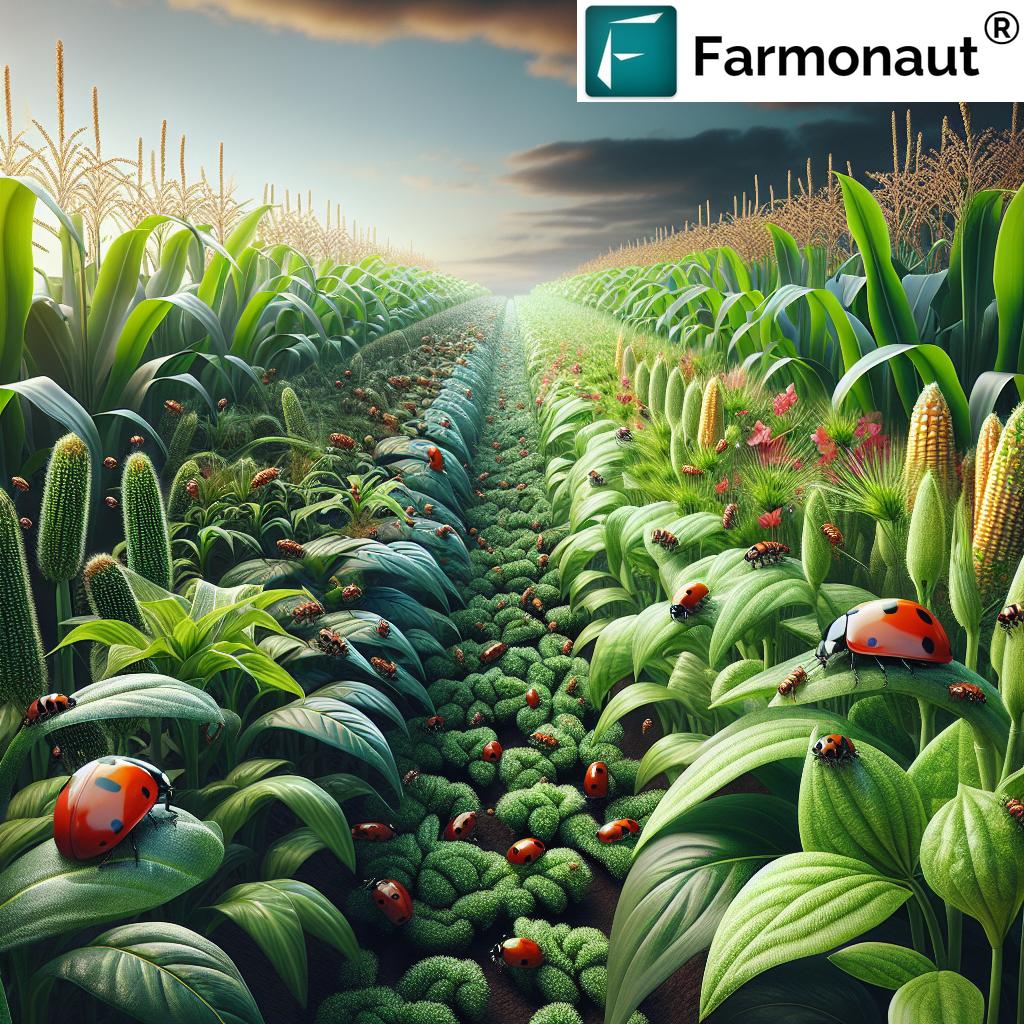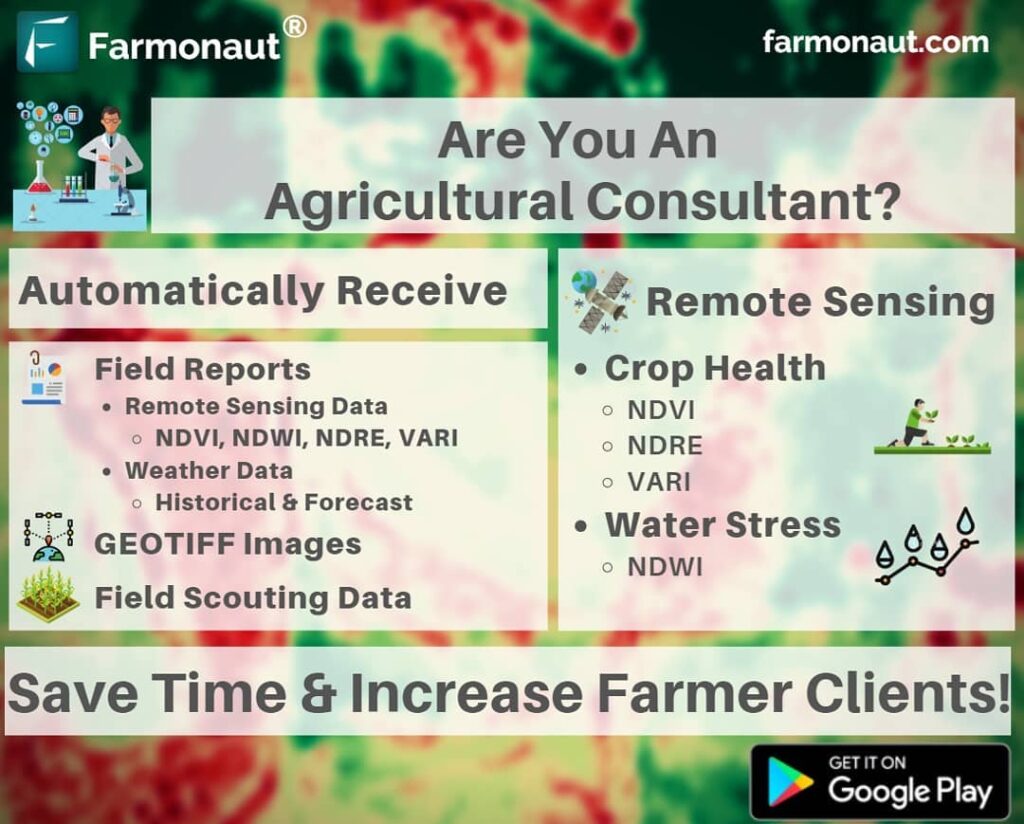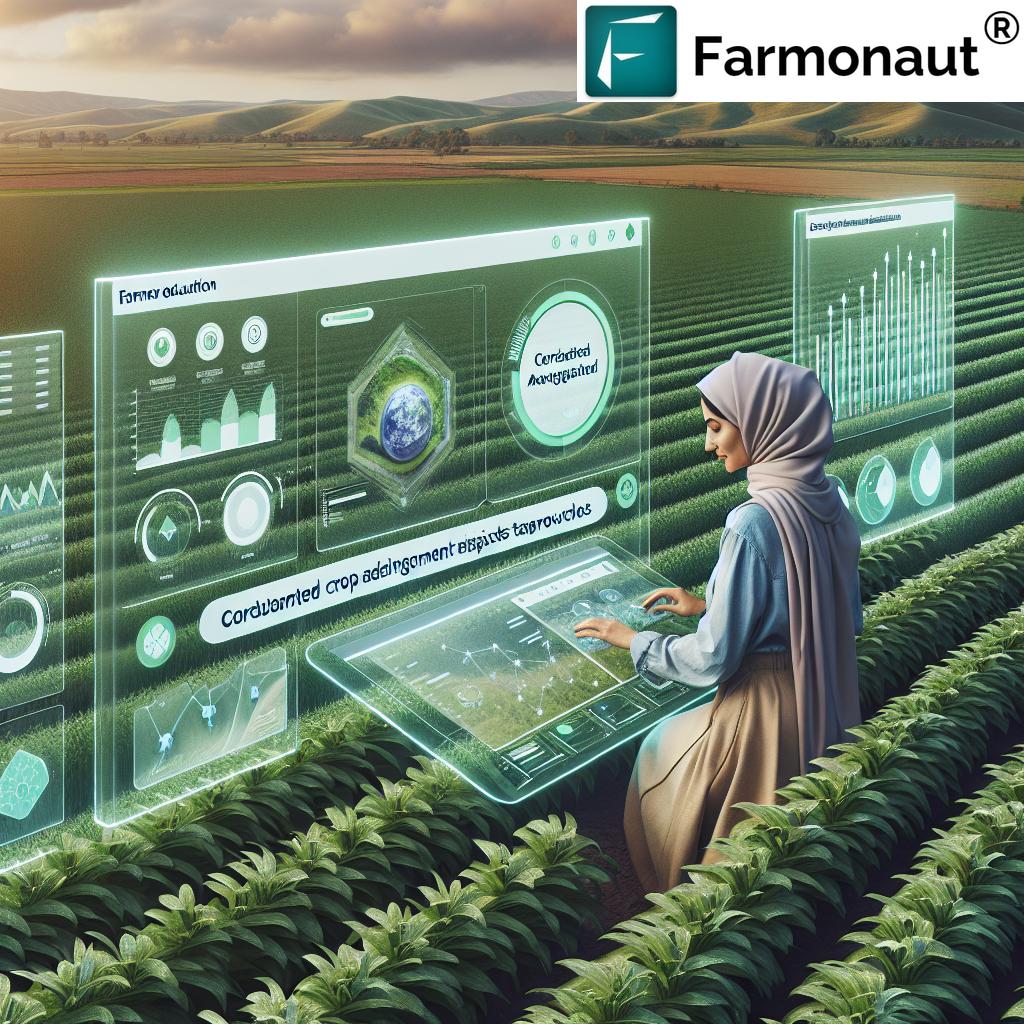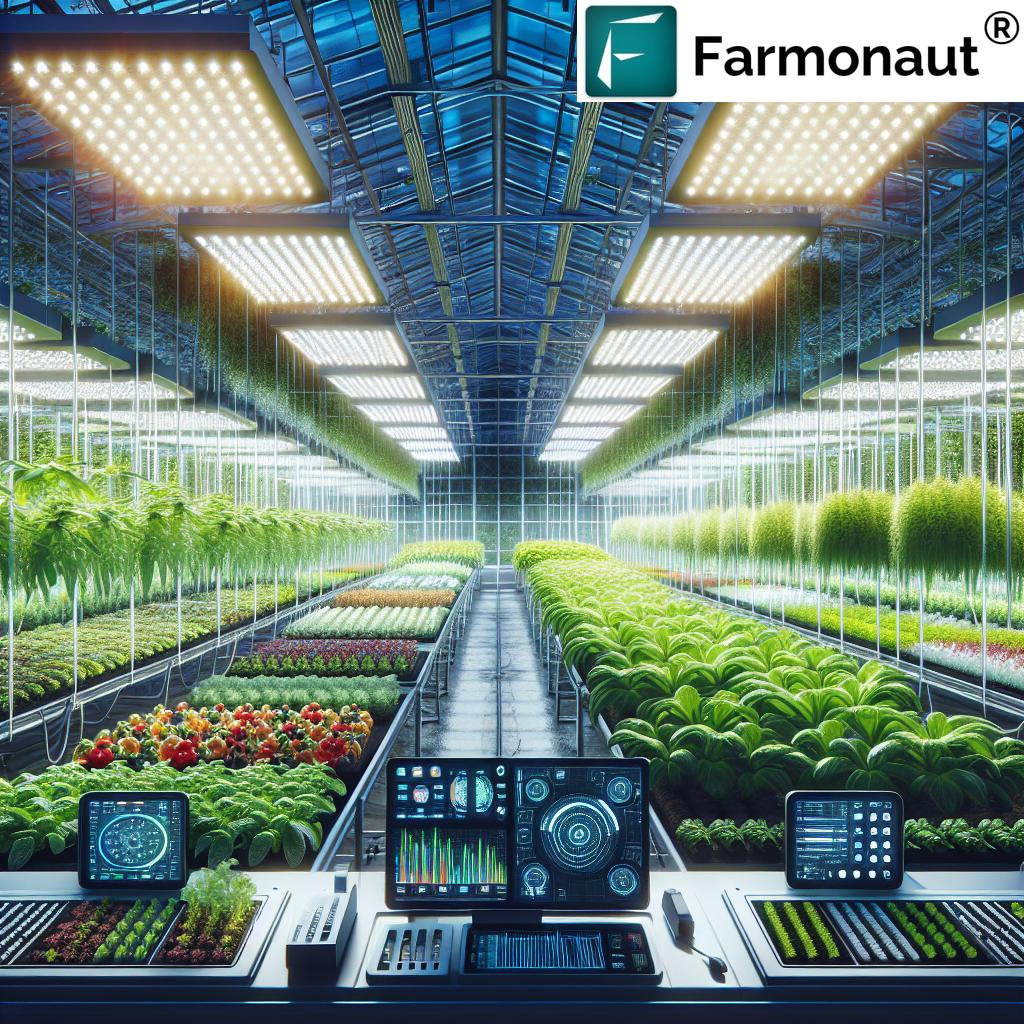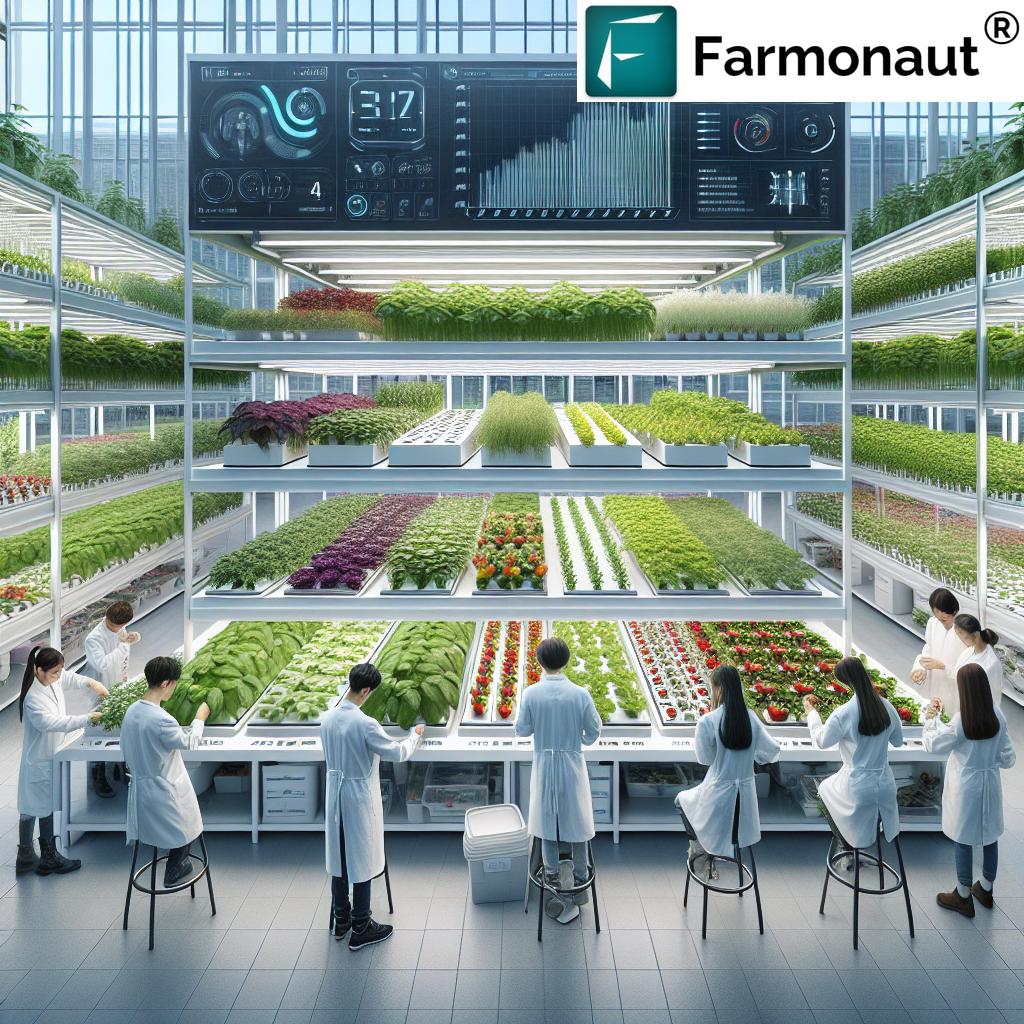“Biologicals can reduce chemical pesticide use by up to 30%, promoting healthier soil and eco-friendly farming practices.”
Agricultural Biologicals for Sustainable Farming: 7 Benefits
The push for agricultural biologicals is transforming the landscape of modern agriculture. With the pressing need for sustainable farming solutions, the adoption of biological products that enhance crop health, improve soil, and offer environmental value has never been more vital. At the core of this movement is the reduction of chemical inputs in farming and a concentrated effort to minimize negative environmental impact.
In this comprehensive guide, we delve deep into the types of agricultural biologicals, showcase the benefits they offer, dissect the challenges of biological products in agriculture, and forecast their pivotal role in the future of sustainable farming. Along the way, we also illustrate how Farmonaut’s technology empowers farmers to monitor, manage, and maximize the effectiveness of these game-changing solutions.
Types of Agricultural Biologicals for Sustainable Farming
Agricultural biologicals are broadly classified based on their function, source, and application in farming systems. Understanding the primary types is essential for realizing how they promote sustainability and enhance crop productivity.
1. Biopesticides: Natural Pest Control and Disease Management
Biopesticides are substances derived from natural sources—including bacteria, fungi, plant extracts, and other microorganisms—that control pests and diseases with minimal environmental impact. Examples like Bacillus thuringiensis produce toxins that specifically target insects but remain safe for humans, animals, and non-target species.
- Reduced risk of pest resistance
- Lower risk of harmful residues on food
- Contribution to environmentally friendly crop protection
2. Biofertilizers for Agriculture: Improving Nutrient Cycling
Biofertilizers contain living microorganisms that improve soil health by fixing atmospheric nitrogen, solubilizing phosphorus, or mobilizing other nutrients. These biologicals are crucial in restoring the natural nutrient cycle, increasing soil fertility, and reducing reliance on synthetic fertilizers.
- Examples: Rhizobium (bacteria for nitrogen fixation), Trichoderma species (fungi for phosphorus solubilization)
- Promotes healthier soils for increased yields
- Supports organic and sustainable farming solutions
3. Biostimulants: Boosting Plant Resilience and Efficiency
Biostimulants comprise substances or microorganisms—excluding fertilizers—that enhance plant growth, improve nutrient efficiency, and boost stress tolerance. They’re especially valuable under environmental stresses like drought, salinity, or temperature extremes, making them indispensable for sustainable farming.
- Stimulates uptake of nutrients
- Improves plant resilience and productivity under stress conditions
- Complements biofertilizers and other sustainable practices
Key Takeaway
- Agricultural biologicals encompass a diverse set of solutions that enhance crop productivity, restore soil structure, and offer a pathway to reduce chemical inputs in farming.
- Their role is central to sustainable agriculture, helping meet both food production and environmental objectives.
7 Benefits of Agricultural Biologicals for Sustainable Farming
Embracing agricultural biologicals delivers measurable advances in eco-efficiency, soil vitality, crop output, and food safety. Here’s how these products and practices are reshaping farming for the better:
1. Environmental Sustainability and Pollution Reduction
By integrating more biologicals and fewer synthetic chemicals, farms can reduce chemical inputs, leading to a decrease in soil and water pollution. This shift contributes to biodiversity by preserving beneficial organisms and reducing toxic runoff.
- Supports overall environmental sustainability
- Promotes water conservation and aquifer purity
- Helps maintain a balanced ecosystem
2. Enhanced Soil Health and Fertility
Biofertilizers for agriculture and smart biostimulants improve soil health by restoring organic matter, repairing degraded soil structure, and enabling the natural nutrient cycle. They promote healthier soils with better water retention and increased biological activity.
- Encourage beneficial microorganisms and fungi within the soil
- Lift soil fertility for increased yields
- Restore degraded land and promote long-term productivity
3. Pest Resistance Management and Reduced Pesticide Reliance
Biopesticides play a pivotal role in pest management strategies, using natural pest control methods to manage resistance and protect against pathogens. Their diverse application reduces risk of pest resistance and maintains efficacy in the long-term.
- Mitigate the risk of “super-pests”
- Diversifies the range of methods farmers use for pest control
- Yield more stable results over successive seasons
4. Food Safety and Consumer Trust
Demand for organic and minimally processed food is skyrocketing. Agricultural biologicals are central to safe, residue-free crops that meet food safety standards and inspire consumer confidence. This reduces the environmental impact across the whole value chain.
- Lower chemical residues on harvested crops
- Improves market access for organic products
- Align with stringent international food safety standards
5. Enhanced Crop Productivity and Quality
Biological products work synergistically with plants, improving their growth, nutrient uptake, and resilience to stresses. This results in not just higher yields but also better crop quality and shelf life—crucial in catering to a global demand for food.
- Increase crop yields and overall farm profitability
- Improve nutritional and market value of produce
- Enhance tolerance to adverse weather and stress conditions
6. Biodiversity Conservation and Ecosystem Health
The reduced use of broad-spectrum chemical inputs translates into improved biodiversity both above and below ground. Biologicals allow native flora and fauna to flourish, supporting pollinators, beneficial insects, and microbial life that underpin healthy, productive agroecosystems.
- Preserve pollinators and beneficial insects
- Support wildlife and beneficial soil organisms
- Encourage resilient, self-sustaining ecosystems
7. Improved Farmer Safety and Community Health
Reducing dependence on hazardous chemicals makes farm environments safer for agricultural workers and communities. The adoption of biological solutions diminishes risks of accidental exposure, poisoning, and long-term health issues.
- Promote better occupational health practices
- Reduce incidence of chemical drift and contamination
- Support vibrant, healthy farming communities
“Over 60% of farmers using agricultural biologicals report improved crop resilience and reduced environmental impact.”
Farmonaut’s advanced resource management tools empower you to monitor real-time soil health, crop growth, and resource allocation, ensuring the optimal timing and precision application of biological products on your fields. Learn more about large-scale farm management with Farmonaut.
If you’re seeking transparent, traceable food supply chains and certifications for sustainably grown crops, Farmonaut’s blockchain-based product traceability helps verify each stage, from farm practices to end consumer—vital for both organic brands and export markets.
For agribusinesses dedicated to carbon neutrality, Farmonaut provides precise carbon footprinting services to track and reduce environmental impact—critical to global climate and sustainability initiatives.
Estimated Impact of Agricultural Biologicals vs. Conventional Chemical Inputs
| Benefit | Estimated Impact with Biologicals | Estimated Impact with Chemicals | Environmental Notes |
|---|---|---|---|
| Soil Health Improvement | Up to 40% enhancement in organic matter & microbial diversity | Often decreases long-term fertility due to chemical residues | Biologicals restore natural cycles; chemicals may degrade structure |
| Reduction in Chemical Use | Can reduce pesticide/fertilizer use by up to 30% | 100% reliance, increasing over time due to resistance | Major decrease in soil & water contamination with biologicals |
| Crop Yield Enhancement | 5–20% yield increase, esp. in stressed conditions | Variable; often plateaus or declines as chemicals increase | Biologicals increase resilience and yield sustainability |
| Environmental Impact | Significantly lower carbon footprint & pollution | High emissions, water and air pollution | Biologicals vital for climate goals and clean food systems |
| Cost Efficiency | Lower input costs over seasons (up to 20% savings) | Rising costs due to resistance and input escalation | Biologicals offer better ROI long-term |
| Biodiversity Support | Promotes beneficial insects, birds, soil fauna | Suppresses non-target species, reduces diversity | Vital for ecological balance and resilience |
| Farmer Safety | Greatly reduced health risks | More exposure to dangerous chemicals | Biologicals support occupational health |
Challenges of Biological Products in Agriculture
Despite clear benefits, agricultural biologicals face obstacles to widespread adoption. We must consider not only their effectiveness but also operational, logistical, and institutional hurdles:
1. Performance Variability and Environmental Conditions
Variability in product performance can result from changes in soil composition, weather, pest populations, or application techniques. This sometimes discourages farmers from relying solely on biologicals in pest management or fertilization.
- Dependent on local soil conditions, climate, and microbial interactions
- Requires careful research and site-specific application strategies
- Continuous monitoring is crucial — Farmonaut’s satellite-based crop health monitoring solutions help mitigate this by providing real-time field data and AI-powered advisories. Try Farmonaut Jeevn AI for adaptive farm advisory.
2. Shelf Life and Storage Requirements
Many biological products, particularly those containing living microorganisms, have limited shelf life. They often need specific temperatures and storage conditions, posing logistical challenges to distribution and field application.
- Ensuring product viability throughout the supply chain
- Improper storage may lower efficacy or waste investment
- Ongoing development of more stable formulations is essential for market expansion
3. Regulatory Hurdles and Standardization
The regulatory environment for biologicals is complex, with validation and approval requirements differing by region. Inadequate or delayed regulation hinders commercialization and does not keep pace with innovation.
- Need for harmonized standards and faster approval processes globally
- Efforts underway for global alignment, but region-specific regulations persist
- Regulation must balance safety, efficiency, and ease of market access
4. Farmer Awareness and Training
Adoption hinges not just on availability but on farmer education. Integrating new methods requires training and support—especially in tailoring products to suit variable soils and crops.
Farmonaut delivers AI-based advisories, resource management solutions, and user-friendly data platforms to help bridge this knowledge gap.
5. Economic Factors and Market Development
While biologicals may reduce input costs over time, initial investment, scaling, and market readiness continue to pose challenges, especially in regions unused to sustainable farming solutions.
- Need for supportive policies and incentives
- Careful integration with conventional practices to ensure minimal disruption
- Expansion of distribution networks for rural accessibility
Efficient fleet management and secure crop loan verification are critical in deploying and monitoring input application at scale. Explore Farmonaut’s fleet management platform for cost savings and risk mitigation. For banks and insurers, Farmonaut provides satellite-based verification services to streamline approvals, reduce fraud, and expand farmer access to financing.
The Future of Agricultural Biologicals and Sustainable Farming Solutions
The global market for agricultural biologicals is poised for exponential growth. According to recent industry projections, the market is expected to leap from $15.12 billion in 2024 to $43.53 billion by 2035—a steady CAGR of 10%.
- Driven by increased demand for sustainable farming solutions
- Major investments in research and product development from leading agricultural companies
- Rising climate pressures and consumer trends drive innovation
- Ongoing integration of digital technologies, satellite data, and AI optimizes application, monitoring, and results
Innovation and Technological Advancements
We’re entering an era where agriculture is digitally enabled. Tools like satellite-based farm management apps and AI-powered advisory platforms are providing farmers with up-to-date information on soil health, crop conditions, and optimal timing/methods for biological applications.
- Farmonaut leverages satellite imagery and AI to deliver actionable insights for smarter input application and real-time monitoring
- Blockchain-based systems ensure full traceability, enhancing food safety and exporting potential
- APIs make it possible for third-party developers and researchers to integrate real-time agricultural data into new tools – access the Farmonaut API here.
Technical specifications? Visit the Farmonaut Developer Docs.
How Farmonaut Supports Sustainable Farming Practices
Empowering Global Farmers With Data-Driven Solutions
At Farmonaut, we believe in making precision agriculture accessible, affordable, and impactful. Our mission aligns perfectly with the values underlying agricultural biologicals:
- Satellite-based crop health monitoring: We provide detailed NDVI maps, real-time alerts on vegetation stress, and precise soil moisture data—helping farmers make timely decisions regarding biological input usage and adaptation under changing conditions.
- Jeevn AI Advisory System: This AI-driven platform delivers actionable, personalized advice on fertilizer dosing, irrigation, and pest management strategies—maximizing the effectiveness of biologicals while supporting sustainability.
- Resource and fleet management: By offering logistics tracking and resource allocation tools, we help agribusinesses optimize the distribution and deployment of biological products, fertilizers, and machinery.
- Carbon footprinting & traceability: Our platform enables carbon tracking for farms committed to reducing environmental impact, and end-to-end product traceability for strict organic or fair trade supply chains.
We continuously work to bridge the gap between technology and traditional practices, supporting farmers, agribusinesses, governments, and corporations on their journey toward a resilient, sustainable food system.
FAQs About Agricultural Biologicals
What are agricultural biologicals?
Agricultural biologicals are natural products—including biopesticides, biofertilizers, and biostimulants—used to promote crop health, improve soil, and control pests and diseases while reducing the impact of synthetic chemicals in farming.
How do agricultural biologicals improve soil health?
By introducing beneficial bacteria, fungi, and organic matter, biologicals restore natural soil structure, boost nutrient cycling, and enhance soil fertility—leading to healthier, more productive soils.
Are agricultural biologicals effective against pests?
Yes, biopesticides—such as those derived from Bacillus thuringiensis and plant extracts—target pests with less risk of resistance and minimal environmental toxicity.
How do agricultural biologicals support sustainable farming?
They offer environmentally friendly alternatives that reduce pollution, safeguard biodiversity, and enhance crop resilience, forming a key pillar of sustainable agriculture worldwide.
What are the main challenges in adopting biologicals?
The challenges of biological products in agriculture include variability in field performance, limited shelf life, regulatory hurdles, the need for farmer education, and economic barriers to rapid market expansion.
How can farmers integrate biologicals into their current practices?
Start by identifying soil and crop needs via real-time monitoring (using platforms like Farmonaut), replace or rotate synthetic inputs with biological equivalents, and stay updated with AI-based advisories to optimize timing and rates.
Is there a way to track the effectiveness of biological products?
Absolutely. Technologies such as satellite crop health monitoring and field data analytics (as offered by Farmonaut) provide quantifiable indicators—NDVI, soil moisture, yield prospects—to evaluate biological input impact season after season.
Conclusion: The Pivotal Role of Agricultural Biologicals in Sustainable Agriculture
Agricultural biologicals stand at the forefront of the sustainable farming revolution. By reducing the need for chemicals, improving soil health, promoting crop resilience, and supporting biodiversity, they address the twin goals of productivity and environmental stewardship.
The adoption of sustainable farming solutions is growing rapidly. However, overcoming **challenges of biological products in agriculture** will require tailored technologies, continuous farmer education, clear regulatory pathways, and robust monitoring frameworks.
Leveraging state-of-the-art platforms like Farmonaut, farmers and agribusinesses can maximize the effectiveness of biological products and accelerate integration into regenerative farming systems—future-proofing food security while restoring our planet’s natural capital.
Ready to take the leap to precision sustainable farming? Try the Farmonaut App today or explore our APIs for agricultural research and innovation.








